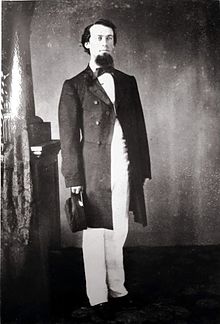Franklin Seaver Pratt
| Franklin Seaver Pratt | |
|---|---|
 |
|
|
Kingdom of Hawaii Consul-General in San Francisco |
|
|
In office 1892–1893 |
|
| Preceded by | David Allison McKinley |
| Succeeded by | Charles Thomas Wilder |
| Personal details | |
| Born |
November 1, 1829 Boston, Massachusetts, United States |
| Died | January 11, 1894 (aged 65) Honolulu, Oahu, Provisional Government of Hawaii |
| Resting place | Oahu Cemetery |
| Nationality |
Kingdom of Hawaii United States |
| Spouse(s) | Elizabeth Kekaʻaniau Laʻanui |
| Alma mater | Franklin Institute |
| Occupation | Politician, businessman, plantation owner, diplomat |
Franklin Seaver Pratt (November 1, 1829 – January 11, 1894), also known as Franklyn or Frank S. Pratt, was an American settler, businessman, public servant and diplomat of the Kingdom of Hawaii. He married Elizabeth Kekaʻaniau Laʻanui, a member of the Hawaiian nobility, and defended her claims to the Hawaiian crown lands during the overthrow of the Kingdom of Hawaii.
Pratt was born in November 1, 1829, in Boston, Massachusetts. His parents were Joseph Pratt and Catherine Seaver. At the time of his death in 1898, he had one brother and four sisters (including the widow of Hawaii businessman Charles Brewer II) who survived him. A younger brother, Tasker S. Pratt, died of consumption in Honolulu on January 9, 1866, at the age of 32.
He was educated at the Franklin Institute in Philadelphia, Pennsylvania. On January 12, 1850, he and William Fessenden Allen sailed for Hawaii, on the ship Eliza Warwick and arrived in Honolulu. Attracted by the California Gold Rush, he briefly settled in San Francisco where he worked with a mercantile firm. However, he later returned and settled in Hawaii by the time of his marriage. Pratt became a successful businessman during his residency in Hawaii. He worked initially in the merchandising business with a Mr. Luddington and later partnered with C. A. Williams in a number of different businesses. He later assumed the agency of the Phoenix Guano Island Company, which he held for seven or eight years, and gained considerable amount of wealth from this venture. After returning from a visit his family in New England, he began investing in the growing sugar plantation industry in the islands. He started Waimanalo Sugar Plantation and build the steamer Waimanalo. In 1881, his investment in the Olowalu plantation on Maui nearly cost him to lose everything he earned. He returned to Honolulu from Maui and worked in the auctioneer business with L. J. Leavey until he began working for the government in 1884.
...
Wikipedia
